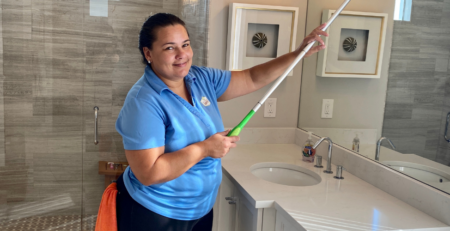5 Tips for Improving Air Quality in Your Home
Your home is where you retreat at the end of a busy day, and where you make special memories with your family. You invest time and money on decorating, organizing, and house cleaning. Having healthy clean air is another factor in making your house comfortable and enjoyable. Here are 5 tips for improving air quality in your home.
What Causes Indoor Air Pollution?
Air pollution is usually thought to be limited to ozone, smog, haze and most other pollutants commonly found outside the home, but unfortunately, several pollutants contaminate both the indoor and the outdoor air quality. Indoor air pollution can be a lot more serious than outdoor air pollution. Some of the most common pollutants that could pollute the air inside your home include lead, radon, fire-retardants, VOC (volatile organic compounds) and even formaldehyde. These come from off-gassing from furniture and building materials, house cleaning products, and paint. The air in a home may also contain high levels of dust, smoke and pet dander.
All these sources of indoor pollution cause poor indoor air quality. They can trigger asthma and allergic reactions. There are also long-term health risks. Your family and pets will benefit from improving the quality of air in your home.
1. Good Ventilation
Ventilation is important to bring fresh air into your home, and allow carbon dioxide, moisture, off-gassing, dust, and smoke to get out. Good ventilation has a huge impact on the quality of air in your home. It can be as simple as leaving room doors open, using the kitchen fan when cooking, and the bathroom fan when showering. There are also strategies with the furnace and venting which can improve air quality and the energy efficiency of your home.
2. Don’t Smoke Indoors
Cigarette smoke contains over 4,000 chemicals, most of which are harmful to our health. We all know that smoking is linked to breathing problems, cancer, stroke and heart attack. Smoke clings to fabric, carpets, and clothing. Smoking is one of the most significant indoor air pollutants. If the smokers in your household can’t quit the habit, ask them to take it outside. It is better for the health of everyone in the house. And it preserves the value of your home. It is estimated that smoking in the house can mean knocking 23% off the asking price when it comes time to sell. We know from our house cleaning experience that tar residue is very hard to clean from walls and cabinets.
3. Clean the Floors
If you are concerned about the health and indoor air in your home, it is necessary to clean the floors. Allergens like dust and pet dander, chemicals from off-gassing, and VOCs will settle on the floor. Make sure your house cleaning routine includes regular vacuuming and mopping. Use a good-quality microfibre mop and water, or add just a small amount of a gentle pH-neutral cleaning product which won’t introduce more chemicals into your home.
4. Get the Right Humidity
Mold and dust mites both thrive in a humid environment. Use the bathroom and kitchen fans to vent the damp air of showers and cooking. This will also help reduce mold and mildew. Basements often benefit from having a dehumidifier. If your home has baseboard heating, you may require a humidifier during the winter months. Pick up a hygrometer from your local hardware store to check the level in your home. Getting the right humidity balance for your home may require a little effort, but it has huge payoffs in the comfort and health of the air in your home.
5. Grow Plants
Remember middle-school science class? Plants process carbon dioxide and produce oxygen. Growing plants in your home makes a huge impact on the air quality of your home. Plants can also filter the air by absorbing pollutants like formaldehyde, trichloroethylene, benzene, toluene, xylene, and ammonia. Some favourites are English Ivy, variegated snake plant, Peace Lily, and chrysanthemum. Just be careful with small children and pets – some of these plants are toxic if eaten.
We hope you found these 5 tips useful for improving air quality in your home. The health and comfort of you and your family will really benefit from these strategies to make the air clean and fresh.





